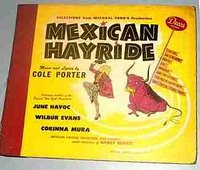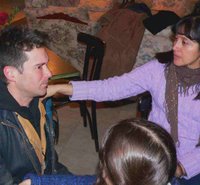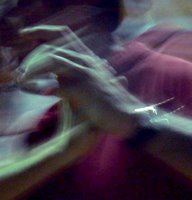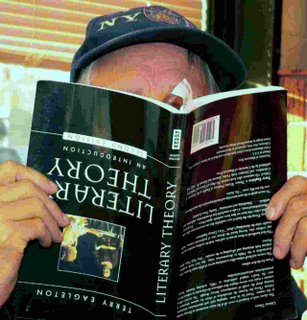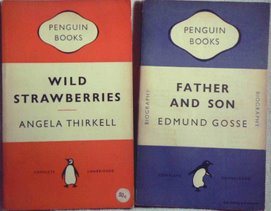Feliz Navidad - More Than Offering Another Hallmark Remark
Maybe a multicultural, multilingual celebration of Christmas has become harder to organize and pull off well, or is less meaningful, the more urgently 'we' all need to pull together collectively to solve global problems.
My personal cultural background as a north american white, anglo-saxon protestant away from home at Christmastime has exposed me to a lifetime of phony commercial attempts to link Christmas with excessive spending (for gifts, foods and entertainment). Expressions of fellow-feeling with Other Cultures, Other Peoples over the Holiday Season were once-upon-a-time framed as paternalistic gestures in the mould of extending kindness to those less fortunate than 'we' are.
Yesterday Dulio, an Argentinean, and I hefted a donated television set from the car trunk of a Jewish woman who dropped it off at COCLA for the Latino community charity drive. She helped in the effort (for awhile), but you could tell that all she wanted to do was to 'dump' the thing and get back to her own affairs as quickly as possible. (I cannot blame her a bit.)
After wrestling that huge, boxy behemoth T.V., all any person could possibly feel is how much we'd rather have a flat-screen LCD model that is so light and thin it could simply be hung on a wall, plugged in, and forgotten.
Gift-giving, unlike sharing baked bread or a homemade casserole, has started to be chosing the "latest model" hi-tech gadget for those in your immediate family and a rush to the mall for low-tech surrogates for gift-giving outside the family circle. 'Things' are either 'the latest model' or they are garbage, a mere hand-me-down or stocking stuffer.
Where I missed the boat in giving gifts to my friends, once again this year in 2006, was in not making the effort to procure color prints from my digital images (the snapshots I've taken over the entire year). Receiving a candid portrait tucked inside a nice card with a personal note (in the recipient's own Spanish, English or French language - whatever) would please each person I know well enough to give a gift to . . But it's not too late with New Year's Day coming!
I cannot get away with just putting these digital images up on the web and giving a copy of the URL address to the recipients of my holiday greeting cards -- simply because the adults I know do not browse the web and (except for email) are intimidated by what they see via the Internet. Yet everybody I know loves to receive a bunch of color prints they can hold in their paws.
For expressing my holiday cheer to Spanish speakers, this year I am discovering that the best I can do is to take the time to attempt to communicate with them by trying to talk about their original home town, about family members still in the home country and ones living here in Montreal while attempting to tell them about my own family back home and my own daughters who have grown up in Quebec. I find myself carrying more and more wallet-sized photos of family. Nothing works better when trying to converse than to ask about a person's family, about where they came from geographically (and in detail), while trying to give similar accounts of my own origins and my own family.
It is an irony; in our own culture depictions of family conversation tend to accentuate the two extremes: saccharine images of 'Father Knows Best' bonhommie and bitter feuding and strife between generations forced to pretend they can celebrate anything together. The irony comes from how satisfying it can feel to get away from the immediate family and try to communicate with a person who does not even speak your own language and who does not even celebrate the holidays like all the Masses of shoppers in our Canada-American culture.
You can consider yourself a member of a privileged caste if, somehow, you can find the time and energy over the holiday break to get away from Family and make the time to talk face-to-face with a nearby 'stranger' away from all the hustle and bustle. These stolen moments give meaning to that otherwise Hallmark cliche 'It was a privilege to make your acquaintance.'

